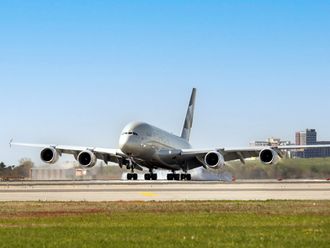Dubai: Emirates has appointed three UAE nationals to key management positions within its commercial and cargo operations team in the Middle East.
The appointments, which will take effect from 1 June 2017, are expected to enhance the airline’s commercial and cargo presence in the region.
The three appointees have years of experience in their line of work and are considered experts in their field.
“All three UAE nationals who will be taking on new roles have a deep understanding of the business and operations at Emirates, from both the passenger and cargo side. We believe that this will strengthen our leadership team and will deliver significant benefits to maximise our commercial performance in the region,” said Thierry Antinori, executive vice president and chief commercial officer.
In the UAE, Emirates has named Abbas A Haji as vice president hub operations for SkyCargo. Abbas will be in charged of Emirates SkyCargo’s hub operations in Dubai at both Al Maktoum International Airport and Dubai International Airport.
Abbas joined the Emirates Group in 1977, working for dnata Cargo. He has held several positions across the group since then and previously held the role of vice president Iran, Iraq and Central Asia, running the airline’s commercial operations activities in multiple markets.
Mohamed Khoory will be taking on the role as manager Iran. Mohamed joined Emirates in 2011 as part of the UAE National Management Programme for Commercial Operations.
He had previously held commercial posts in India and the United States prior to his appointment as district manager in Dammam, Saudi Arabia. More recently, he held the role of manager Jordan and West Bank, heading the market’s commercial and business development activities.
In Jordan, Emirates named Sultan Alriyami to drive the airline's commercial priorities in the market as well as build on Emirates’ business performance as manager Jordan and West Bank.
Sultan joined Emirates in 2014 as part of the UAE National Trainee Management Programme for Commercial Operations. Since then, he has held commercial support roles in Singapore, and more recently in Iran.
The global airline, which has received numerous aviation awards, serves 151 airports in 80 countries from its hub in Dubai. Its fleet of Airbus and Boeing 777 aircraft is said to be the world’s largest.
It maintained that its operations in the Middle East market continue to grow with the region witnessing a 3.6 per cent increase in revenue in 2016/2017 over the previous financial year.
The half-year financial results for 2016-2017, however, showed that the company has been hit by the “double impact of a strong US dollar and challenging operating environment.”
Last November, it was reported that Emirates Group’s half-year net profit for 2016-2017 reached Dh1.3 billion, down 64 per cent.












